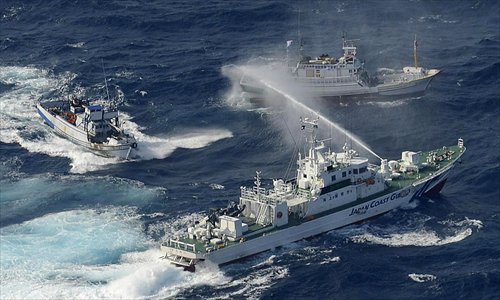M WAQAR..... "A man's ethical behavior should be based effectually on sympathy, education, and social ties; no religious basis is necessary.Man would indeed be in a poor way if he had to be restrained by fear of punishment and hope of reward after death." --Albert Einstein !!! NEWS,ARTICLES,EDITORIALS,MUSIC... Ze chi pe mayeen yum da agha pukhtunistan de.....(Liberal,Progressive,Secular World.)''Secularism is not against religion; it is the message of humanity.'' تل ده وی پثتونستآن
Tuesday, September 25, 2012
Chinese FM urges Japan to ‘correct’ errors over Diaoyu
During a "candid and in-depth" exchange of views over the Diaoyu Islands, the Chinese foreign ministry asked Japan to abandon any illusions it holds, and face up to the ramifications caused by its mistakes, which should be corrected with credible steps.
China will not tolerate any unilateral action taken by Japan that infringes on China's territorial sovereignty, Vice Foreign Minister Zhang Zhijun was quoted as saying Tuesday by the Xinhua News Agency when meeting his Japanese counterpart Chikao Kawai in Beijing.
Zhang urged the Japanese side to recommit itself to the consensus and understanding reached between the two countries' leaders, so that bilateral relations could be put back on track toward a sound and stable footing.
The two sides agreed to maintain consultative discussions over the Diaoyu Islands, according to a statement.
Liu Jiangyong, an expert on Japanese studies with Tsinghua University, said Tuesday that Zhang's remarks indicated fractured bilateral relations would not be eased unless Japan abandoned its decision to "nationalize" the islands.
"China's assertion on the Diaoyu Islands is of great strategic significance," said Liu.
According to Japanese media, Japanese Foreign Minister Koichiro Gemba had planned to seek talks with his Chinese counterpart Yang Jiechi on the sidelines of the UN Assembly to ease the mounting tensions.
Besides diplomatic consultations, the Chinese government also stepped up countermeasures against Japan Tuesday by releasing a white paper on the Diaoyu Islands in Chinese, English and Japanese.
The white paper, entitled "Diaoyu Dao, an Inherent Territory of China," was released Tuesday by China's State Council Information Office, asserting China's resolve in safeguarding its sovereignty and territorial integrity.
Liu said the white paper, as the most comprehensive and authoritative document issued on the Diaoyu Islands so far, had provided important access to the historical facts for people in China, Japan and other countries and regions.
"Japan's official documents show that from the time of the fact-finding missions to Diaoyu Dao in 1885 to the occupation of the islands in 1895, Japan consistently acted in secrecy without making its moves public. This further proves that Japan's claim of sovereignty over Diaoyu Dao does not have legal effect under international law," the white paper reads.
Despite the Japanese government's efforts to cool the tensions, it has filed an objection at the United Nations over China's application to amend maritime maps, NHK World reported Monday.
China's envoy to the UN Li Baodong filed a copy of the Chinese government's Diaoyu Islands baseline announcement to the UN on September 13, according to Xinhua.
Former Japanese Prime Minister Yukio Hatoyama declined China's invitation Tuesday to visit Beijing on the 40th anniversary of the normalization of diplomatic ties between the two countries, according to Kyodo News.
More signs of the impact on China-Japan relations have started to surface in the economic sector.
Flights to Japan in September and October have either been canceled or reduced by Chinese airlines, including Air China, China Hainan Airlines and China Southern, Xinhua reported. China Eastern Airlines and Juneyao Airlines have postponed their plans to open new routes to Japan.
According to Kyodo News, Japan's largest airline, All Nippon Airways, announced that about 37,000 seats of flights between China and Japan had been canceled between September and November by last Friday, including 10,000 from Japan to China, and 27,000 in the opposite direction.
Japan Airlines said about 15,500 seats had been canceled as of Monday.
Toyota Motor Corp announced Tuesday it would reduce its production of automobiles bound for the Chinese market due to plunging sales in the wake of anti-Japan protests in China, Kyodo News reported.
According to Taiwan media, about 100 fishing boats from Taiwan that had sailed to the waters of the Diaoyu Islands to demonstrate sovereignty claims Monday decided to finish their protests at 9 am and return to Yilan (or Ilan) at noon on Wednesday.
The boats pressed forward to an area about three nautical miles from the islands while evading water cannons from the Japanese vessels, according to the report.
Taiwan leader Ma Ying-jeou reiterated his support Tuesday for the fishermen's protests, calling on Japan to respect Taiwan fishermen's rights in their traditional fishing areas, local media said. Ma also said he hoped the US would stay neutral in sovereignty issues relating to the Diaoyu Islands.
Subscribe to:
Post Comments (Atom)


No comments:
Post a Comment